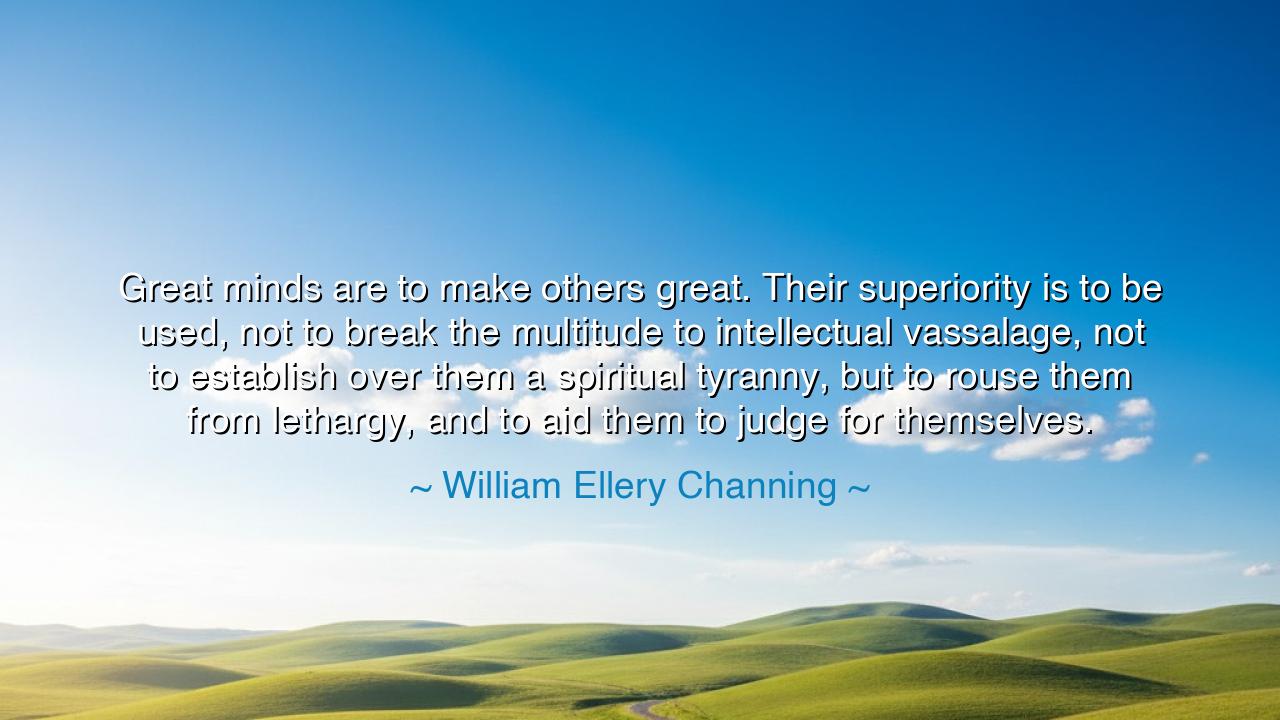
Great minds are to make others great. Their superiority is to be
Great minds are to make others great. Their superiority is to be used, not to break the multitude to intellectual vassalage, not to establish over them a spiritual tyranny, but to rouse them from lethargy, and to aid them to judge for themselves.






Hearken, O children of wisdom, and attend to the words of William Ellery Channing, who proclaimed with clarity that the task of the great mind is not dominion, nor the subjugation of the many, but the elevation of all: “Great minds are to make others great. Their superiority is to be used, not to break the multitude to intellectual vassalage, not to establish over them a spiritual tyranny, but to rouse them from lethargy, and to aid them to judge for themselves.” Here lies a profound teaching, as ancient as the earliest sages: the power of intellect is not a crown to be worn, but a flame to be shared, lighting the path for those who follow.
In the dawn of human thought, the wise were revered not merely for their knowledge, but for their capacity to uplift others. Channing reminds us that intellect divorced from empathy becomes tyranny; wisdom hoarded is a treasure locked in a tomb. True greatness is revealed in the act of guiding others toward their own understanding, of stirring them from the dullness of habit, the inertia of conformity, and the slumber of unexamined life. It is the noble duty of the learned to awaken curiosity, judgment, and courage in the hearts of the multitude.
Consider the life of Socrates, who walked the streets of Athens, questioning, challenging, and awakening minds with nothing but dialogue and inquiry. Though he wielded profound wisdom, he sought not to dominate, but to stimulate self-reflection and independent thought. Through his method, many a citizen was roused from lethargy, empowered to judge for themselves, and awakened to truths hidden by the illusions of convention. Channing’s words echo this ancient philosophy: the gift of the mind is not mastery over others, but stewardship of their awakening.
In more recent times, think of Maria Montessori, whose brilliance in education reshaped the way children encounter knowledge. She did not impose her intellect as a yoke, but designed environments and methods that allowed young minds to flourish, to explore, to judge, and to grow in autonomy. The principle is timeless: a great mind achieves its full measure not when it dominates, but when it enables others to rise, when its superiority becomes a ladder rather than a barrier, when knowledge becomes liberation rather than enslavement.
Channing’s counsel warns against the subtle tyrannies that can emerge under the guise of wisdom. Leaders and teachers who confuse authority with intellect risk creating a spiritual and intellectual bondage, sapping the initiative of those they are meant to guide. The greatness of a mind is therefore measured not by how many follow blindly, but by how many are awakened, challenged, and empowered to think independently. True leadership of intellect is an act of liberation, not coercion.
From this teaching, a lesson emerges for every seeker of wisdom: cultivate your mind not to assert power, but to serve, elevate, and inspire. Share knowledge generously, question assumptions boldly, and encourage others to question as well. Just as a candle lights another without losing its own flame, so does a great mind magnify itself by igniting the light in others. Remember, the measure of greatness lies in the number of minds awakened, not the number subdued.
Practical steps flow naturally from this reflection. Mentor with patience, teach with humility, and seek opportunities to stir curiosity and critical thought in those around you. Encourage debate, celebrate insight, and challenge complacency, for it is in these acts that intellect fulfills its highest purpose. Let your superiority be a bridge, not a chain, a guidepost, not a gaoler. In doing so, you honor the true calling of thought, the sacred duty of the learned, and the enduring promise of human flourishing.
Thus, O children of future generations, take this wisdom into your hearts: the purpose of a great mind is not to rule over others, but to raise them, to awaken them, to grant them the courage to think, judge, and act for themselves. Let your knowledge become a torch, your insight a spring of life, and your deeds a beacon, that the world may be filled not with followers of a mind, but with minds awakened to their own greatness.
If you wish, I can also craft a more lyrical, audio-ready version with rising and falling rhythm, so it feels like an ancient epic being spoken aloud. Would you like me to do that?






AAdministratorAdministrator
Welcome, honored guests. Please leave a comment, we will respond soon